The Fine Art of Deception: A Provincetown Mystery by Jeannette de Beauvoir Releases June 15th ➱ Book Pre Order with Guest Post & Rafflecopter
The Fine Art of Deception
Sydney Riley Series Book 9
by Jeannette de Beauvoir
Genre: Mystery, Female Sleuth
Trouble
is in the wind for wedding planner and amateur sleuth Sydney
Riley
Her
boss Glenn has grown secretive; her best friend Mirela is hiding
something, and Sydney’s daily routine at the Race Point Inn has
grown stale. Sydney’s boyfriend, Ali, is in town as part of an
investigation whose details he’s hesitant to share, and living
together in her tiny apartment has become a challenge, to say the
least. Any charm she’d found in her hand-to-mouth existence has
disappeared.
Something has to give—and it does: A visit from
Sydney’s father turns treacherous when the investigation of a
hit-and-run death leads her to the intimidating and subterranean
world of high-priced art. Then Glenn vanishes as a dangerous storm
races up the coast, and Sydney comes face-to-face with deception—both
on canvas and in real life.
Jeannette de Beauvoir’s flare
for drama, detail, and suspense brings the art world to life in this
ninth book in the Provincetown Mystery Series.
**Releases June 15th!!**
**Find out about the rest of the series here!**
Can you, for those who don't
know you already, tell something about yourself and how you became an author?
I’ve always been a writer. It’s all I’ve ever been really
good at, though I had to fail at several other careers before I was ready to
accept that. When I was in some summer camp in third grade the staff predicted
that someday I’d be an author, so maybe the writing was—so to speak!—on the
wall. After that, it was just a matter of focusing on my writing practice, about
writing more difficult things, about finding my voice.
What is something unique/quirky about you?
Um—everything? Okay, seriously… I find using the telephone very
difficult. Even transactional calls (making an appointment, verifying
information, etc.) is panic-inducing for me. I have friends who use the
telephone for building and maintaining relationships, and I am always a
disappointment to them. Email saves me. (I also have opinions about the
telephone—people who call out of the blue to chat are in essence saying, I don’t
care if this is a good time for you, it’s a good time for me. My schedule is
more important than yours.” That’s disrespect. With emails, I can send the
thought when I have it, and you can answer at your leisure when you have time.
Much more courteous.)
What are some of your pet peeves?
I live in a tourist destination, so I have to say, the
yearly influx of people here who behave poorly is right at the top of that list.
My town isn’t an ashtray (speaking metaphorically), it’s someone’s home, too.
Where were you born/grew up at?
I grew up in a number of places but my primary home is
Angers, in France’s Loire Valley.
If you knew you'd die tomorrow, how would you spend your
last day?
Honestly? Reading.
Who is your hero and why?
I have so many. One who stands out is Dorothy Day. She was a
writer, a social activist, and a politically radical Catholic, all of which are
important to me and my life. She co-founded the Catholic Worker Movement and
has a lot to say to our own times: in an age marked by widespread violence,
impersonal government, shallow interpersonal commitments, and a quest for
self-fulfillment, her spirit fosters nonviolence and our shared personal responsibility
to the poorest among us.
What kind of world ruler would you be?
A terrible one. I’d give everything away.
When did you first consider yourself a writer?
I’ve always been a writer, but it took a long time for me to
claim it as a description. Probably in my teens, when I wrote my first medieval
novel. I really felt then that I was doing something deliberately and
carefully, rather than just writing self-absorbed adolescent poetry (the latter
of which was, needless to say, uniformly bad).
Do you have a favorite movie?
I have several, actually. Casablanca remains a constant—that
movie has *everything* and has aged surprisingly well. I loved both Reds and Chariots
of Fire, which drew me into a tumultuous and exciting time. More recently I’ve
been looking for movies that help me regain some sort of confidence in the innate
goodness of humanity: so I love Pride and Thirteen Lives.
Which of your novels can you imagine made into a movie?
All of them. Seriously. I think each has an exciting
background that can carry the story no matter who the actors are.
What literary pilgrimages have you gone on?
The Poets’ Corner in Westminster Abbey.
As a writer, what would you choose as your
mascot/avatar/spirit animal?
The crow. Smart and curious and playful and unafraid to make
noise.
What inspired you to write this book?
A deadline? As I’m writing a series, that deadline always
preys on me! But I’d recently revisited the Isabella Stewart Gardner Museum in
Boston, and at the same time read an article about art fraud… that all piqued
my interest. Provincetown is the country’s oldest continuously operating art
colony, so I figured it was time to portray that in one of the series books.
What can we expect from you in the future?
I think this series still has a while to go; this ninth book
introduced some major changes in the characters’ lives, so it will be fun to
see what they do with those changes. I also am starting a new series with a new
protagonist that will involve a fair bit of travel, so I’m looking forward to
that.
Who designed your book covers?
My publisher found an amazing artist named Miladinka Milic, who
has done the covers for this whole series.
If you had to do it all over again, would you change
anything in your latest book?
This book is daring: I didn’t follow the usual mystery
formula that dictates a body appearing within the first three chapters. So it’s
very different in that sense. We’ll see what people think of it. If they hate
it, I’ll wish I had stuck to the formula for sure!
Are your characters based off real people or did they all
come entirely from your imagination?
I do name some real people in my books, but don’t use them
as major characters. Characters are all made up, though I might pick up a
gesture, an expression, that sort of thing from people I observe. But a great
deal of the fun of writing (and storytelling in general) is to create people
and bring them to life.
Do your characters seem to hijack the story or do you feel
like you have the reigns of the story?
(It’s reins, actually, not “reigns.) Totally my characters.
I admire writers who can plot an entire book and make their characters bend to
their will—I read somewhere that John Irving knows the first and last line of
his book and the last line of each chapter before he starts the first
draft, for example. It’s known as a classic dichotomy—to plot or to write to
discover—but at the end of the day, we do what works for us. Within five pages
of starting a novel, my characters are already telling me what they want to do.
It’s easier not to fight them—and it makes for a better story!
Have you written any other books that are not published?
Ha! Of course! Some, naturally, weren’t worth publishing; a
few never found the right “home”; some are partials. I don’t know anyone who
doesn’t have some unfinished or imperfect stories on their computers’ hard
drives!
What are your top 10 favorite books/authors?
Not sure I could name 10, but I’m passionate about several.
First is Phil Rickman—do yourselves a favor, go out right now and read everything
he’s written. His plots have more twists and turns than you can imagine, and
there’s always a whiff of the supernatural at play. Absolutely marvelous. For
sheer beautiful lyrical writing along with fantastic characters and interesting
plots, read everything Tana French has written. I want to be her when I
grow up. I always say that Mary Stewart taught me everything I know
about writing; especially read Nine Coaches Waiting, The Ivy Tree, and The
Moonspinners. Though some of his work is a little uneven, I love reading
and re-reading William Lashner’s Veritas. It’s difficult for
readers in the 21st century to not get irritated with Helen
MacInnes’ misogyny and politics, but for a terrific wartime novel, Assignment
in Brittany can’t be beaten. And speaking of wartime, for French-speaking
audiences, I completely recommend Christine de Rivoyre’s Le Petit
Matin. And I cannot neglect the brilliant English thriller writers who I
still read and re-read: Gavin Lyall, Adam Hall, Geoffrey Household. All
three provide a masterclass in quickening readers’ heartrates!
What kind of research do you do before you begin writing a
book?
All of my novels have something real behind them. It may be
a snippet of history, an unsolved crime, a particular milieu. And whatever the
spark is that started the process of thinking, “that would work in a novel…”
needs, then, to be investigated. I feel I have an unwritten contract with my
readers: you give me your time, I’ll give you a story. But if that story uses
components that I haven’t researched or know much about, I’ll make mistakes,
and fail in delivering my part of the contract. Are there still mistakes? No
doubt; we’re all human. But I keep them to a minimum and do everything I can to
understand what it is I’m talking about before I start talking about it.
Do you see writing as a career?
Well, if it’s not, please don’t tell my mortgage holder!
Do you read yourself and if so what is your favorite genre?
What a funny question. Are there really writers who don’t
read? I can’t imagine what they’d have to say. I read all the time. I read at
the checkout line in the supermarket; I walk around my house with a book in
hand (even walking into furniture, I am so engrossed); I read first thing in
the morning and last thing at night. I read a great deal of nonfiction, both
for research and to be an educated person in the world; I read mysteries and
historical fiction and thrillers.
Do you prefer to write in silence or with noise? Why?
Silence. Even music is distracting. It’s good that I live
alone!
Do you write one book at a time or do you have several going
at a time?
Oh, usually two. But one’s the immediate focus; the other is
there when I get stuck on the first one. Then I finish the first one and the
secondary novel takes center stage!
Pen or typewriter or computer?
Computer, a thousand times over. Look, I wrote my first
published novel on a typewriter. So here’s what happens: you type a page and
then you see one word towards the top that isn’t exactly right. It’s close,
though, and do you really want to retype the whole page just to make one word
marginally better? Of course not. And those marginal words add up. I love being
able to write anything… and, later, make changes. It’s the only way to write!
What are you currently reading?
Right now I’m reading nonfiction about Mount Everest. (Yeah,
it’s research.) But at bedtime I’m reading Lisa Gardner.
What are common traps for aspiring writers?
I think a lot of inexperienced writers want to “feel” it in
order to write. Wait for the Muse to descend and inspire them. The truth is,
that rarely happens. Writing is work. It might be wonderful work, it may be
what you love to do, but it is still work. You still have to keep the seat of
your pants in the seat of the chair, day in and day out, hour after hour, even
when all you’re doing is staring at the screen.
How long on average does it take you to write a book?
Except for last year, I am generally doing between one and
two books every year.
Do you believe in writer’s block?
I believe we get stuck. I think having a fancy name for it
isn’t in our best interests, though… that goes back to just waiting for the
Muse to strike. So… write something else. But don’t stop writing. The longer
you wait, the harder it will be to get back to it. I speak here from
experience.
Jeannette de Beauvoir didn’t set out to murder anyone—some things are just meant to be! Her mother introduced her to the Golden Age of mystery fiction when she was far too young to be reading it, and she’s kept reading those authors and many like them ever since.
She wrote historical and literary fiction and poetry for years before someone asked her what she read—and she realized mystery was where her heart was. Now working on the Sydney Riley Provincetown mystery series, she bumps off a resident or visitor to her hometown on a regular basis.
Jeannette is a member of the Mystery Writers of America, Sisters in Crime, the Author’s Guild, and the National Writers Union. She presents a weekly radio show on the arts streaming on WOMR, a Pacifica network affiliate, and is theatre critic for ptownie.com. Find out more (and read her blog or sign up for her newsletter) at jeannettedebeauvoir.com. You can also find her on Facebook, Instagram, Patreon, and Goodreads.
Website * Facebook * Twitter * Instagram * Bookbub * Amazon * Goodreads
Follow the tour HERE for special content and a giveaway!
$10 Amazon


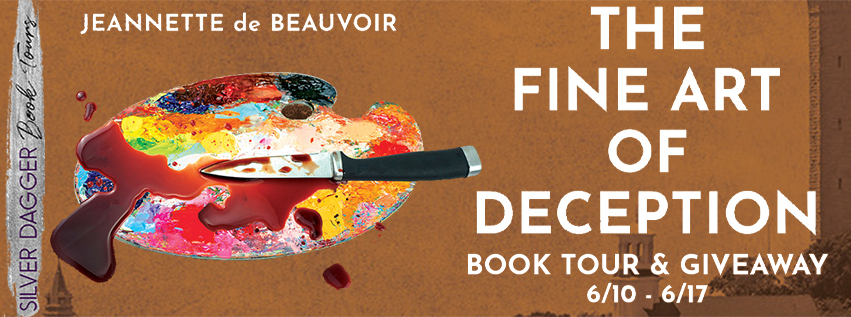
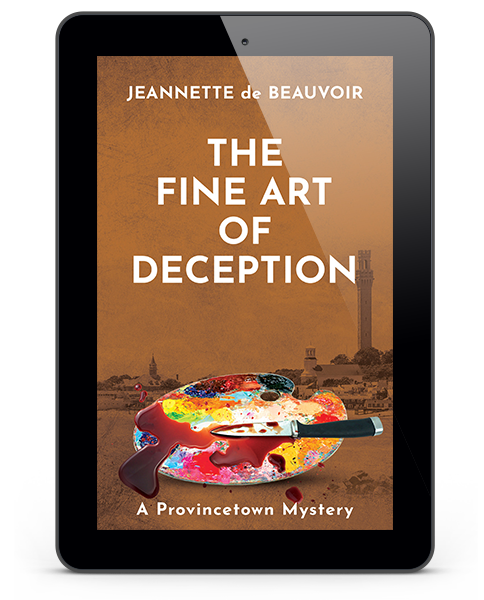

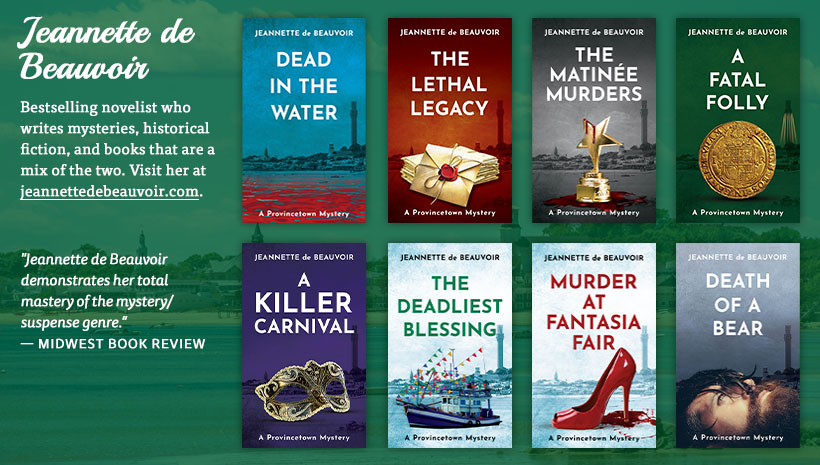



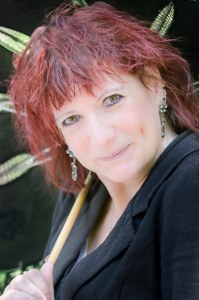

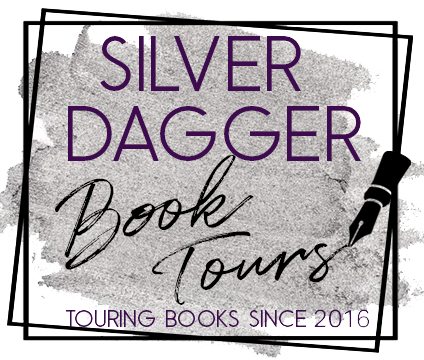
I like the cover art. It looks great.
ReplyDelete